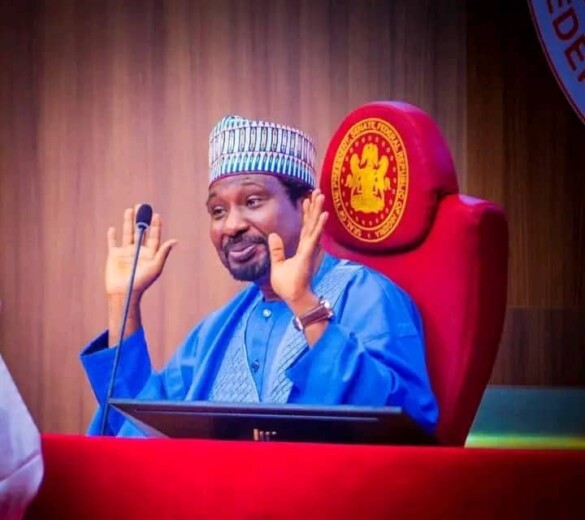In the context of leadership, “The Burden of Truth” refers to the challenges and responsibilities that come with making difficult decisions, confronting harsh realities, and being accountable for one’s actions.
A true leader can confront difficult issues, make tough decisions, and take responsibility for their actions.
The contentious scene unfolded when Senator Ndume protested the entry of Zacch Adedeji, Chairman of the Federal Inland Revenue Service (FIRS), into the Senate chamber. Adedeji was scheduled to brief lawmakers on tax reform bills proposed by President Bola Tinubu.
However, his appearance was not listed on the Senate’s order paper, prompting Majority Leader Opeyemi Bamidele to move a motion to suspend the chamber’s rules.
READ ALSO:
Sanwo-Olu disburses N1.5bn compensation to 149 displaced victims
Ex-Edo NLC Chairman dies after police encounter
Shettima urges national council on privatisation to drive prosperity
Ndume cited Senate regulations, arguing that visitors cannot address the chamber unless their appearance is included in the order paper.
He insisted that a supplementary order paper should have been prepared to reflect the briefing by Adedeji and other tax experts.
This is exactly what happens Senator Barau Jibrin, exercising his power as Deputy Senate President, overruled Ndume’s prayer, allowing Mr. Taiwo Oyedele, Chairman of the Fiscal Policy and Tax Reforms Committee, and other experts to make a presentation to the Senate on the proposed Tax Reform Bill. The same presentation had been made to the House of Representatives and the Nigeria Governors’ Forum.
Currently Deputy Senate President Barau Jibril is navigating a complex web of constitutional duties and moral obligations, as he confronts the burden of truth and rises to the challenge of leadership. This transformative experience demands courage, resilience, and a willingness to tackle uncomfortable realities head-on.
The recent controversy surrounding the tax reform bills has sparked unfair criticism, with some self-centered individuals wrongly linking the bill to Senator Barau Jibril. This has made it challenging for public opinion to remain objective. Despite this, Senator Jibril remains resolute, emphasizing that no public officeholder would intentionally harm their people.
However, critics argue that the proposed changes will exacerbate economic inequality and favor the wealthy, while others believe the bills will disproportionately benefit Lagos, FCT, and Rivers states, leaving other states in a precarious situation.In fairness to justice, Senator Barau neither introduced the bill nor expressed personal opinions on it.
In response to the backlash, Senator Barau Jibril explained in an interview with BBC Hausa that the speedy passage of the bill was intended to allow Nigerians to comment on the legislation before the Senate considers its next steps.
He emphasized that no leader would intentionally take actions that will harm his people, and that the primary concern is understanding the provisions of the bill, which many people, including lawmakers, are still unfamiliar with.
Unknown to people Barau Jibrin has advocated for nationwide awareness campaigns in Hausa, Igbo, Yoruba, to ensure Nigerians understand the bill and its implications.This demonstrates his commitment to transparency and inclusivity. Those individual chose to publicly attack Senator Barau, misleading the public into believing that Barau was behind anti- Masses and the North agenda.
It’s essential for stakeholders to have accurate information about the tax reform bill before forming opinions. The bill is still under review, and further clarifications will be made during subsequent Senate sessions.
Those in support and anti the bills need to engage in constructive dialogue and focus on the best interests of Nigerian. The current political climate must be treated with maturity and responsibility. Divisive tactics and misinformation hinder progress.
For certain reasons Senator Jibril’s should not be made scapegoat on this bill and no one heard him publicly supporting the so called anti masses and anti north.
In spite most people aren’t familiar with the legislative process, which involves several stages that every bill must go through before being passed.
First Reading*: This is when a bill is introduced to senators and members of the House of Representatives .The bill is read on the floor of both chambers, and this stage is called the first reading
. Second Reading*: At this stage, the general principles of the bill are discussed in the chambers. The bill’s sponsors present lead debate, and other lawmakers are allowed to speak on it afterwards. Since the bill is from executive arm, the House Leader will lead debate. After a bill passes the second reading,
Committee Review*: After that the bill referred to relevant committees for further review and legislative action. It’s worth noting that the legislative process can be complex, and there are various rules and procedures that govern how bills are introduced, debated, and passed.
Let not forget that Holy Qur’an admonishes us to always arbitrate every matter with justice and to remove every bias in upholding justice even if it requires taking a stance against one’s own interests. (Qur’an, 4:58),
Therefore, it is the concept of al-‘adl or justice – rather than favoritisms or partiality that should become the underlying basis of all activities of humanity. It should prevail in every aspect of our life be it the comments we make, the judgement we pass, the way we handle our responsibilities and obligations to others and the way we treat others whether they are our friends or foes.
Despite the mortification against his office and person, Deputy Senate President Barau Jibril remains committed to serving humanity and ensuring the well-being of his senatorial district and Kano State, undeterred by unfair criticism and prosecution.
Dukawa wrote it from Abuja can be reached at abbahydukawa@gmail.com 08075704500

